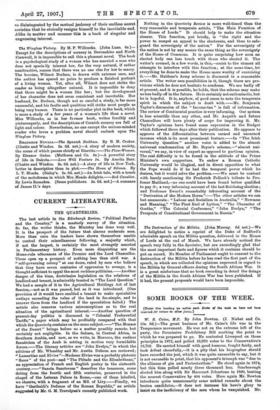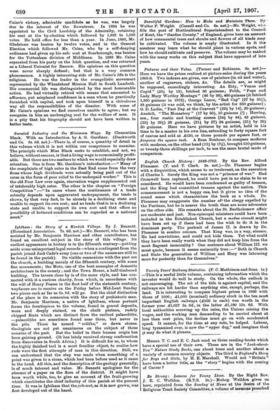SOME BOOKS OF THE WEEK.
(Under this heeding so. 'lotto. Inch Book. of the week as Ions not been reserved for review in ether forma.] W. H. Caine, M.P. By John Newton. (J. Nisbet and Co. 105. 6d.)—The great business of Mr. Caine's life was in the Temperance movement. He was not on the extreme left of the party, the Permissive Prohibitory Bill marking the point to which he was prepared to go. He contested Liverpool on these principles in 1873, and polled 16,970 votes to the Conservative's 18,702. He carried himself with good humour, fought fairly, and took defeat cheerfully,—it is a pity that his biographer should have recorded the jest, which it was quite excusable to say, but it is not excusable to print, that his opponent's triumph was "due to the alliance of gin and Protestantism." He stood again in 187*, but this time polled nearly three thousand less. Scarborough elected him along with Sir Harcourt Johnstone in 1880, beating the nearest Conservative by 484 votes. Here again Mr. Newton introduces quite unnecessarily some unkind remarks about the beaten candidates,—it does not increase his hero's glory to insist on the inefficiency of the men whom he vanquished. Mr. Caine's victory, admirable candidate as be was, was largely due to the interest of the Rowntrees. In 1884 be was appointed to the Civil Lordship of the Admiralty, retaining his seat at the by-election which followed by 1,882 to 1,639 votes. He held office for less than a year. In June, 1885, Mr. Gladstone was beaten by twelve votes, and in the General Election which followed Mr. Caine, who by a self-denying ordinance had given up his safe seat at Scarborough, was beaten for the Tottenham division of Middlesex. In 1885 Mr. Caine separated from his party on the Irish question, and was returned as a Liberal Unionist for Barrow. His opinions on this question were never sharply defined but that is a very common phenomenon. A highly interesting side of Mr. Caine's life is the religious. He was the leader in the evangelistic movement represented by the Wheateheaf Mission Hall in South Lambeth. His commercial life was distinguished by the most honourable action. He had virtually retired with means that amounted to affluence, put misplaced confidence in a man whom he practically furnished with capital, and took upon himself in a chivalrous way all the responsibilities of the disaster. With some of Mr. Caine's opinions we find ourselves unable to agree ; but we recognise in him an unchanging zeal for the welfare of men. It is a pity that his biography should not have been written in better taste.



























































 Previous page
Previous page